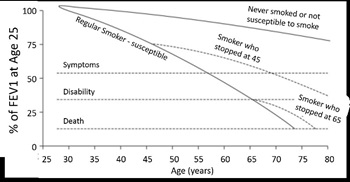It’s Never Too Late to Stop Smoking

It’s hard to stop smoking – even if you want to and even though you know bad things can happen. It’s hard, but it’s also possible. When you have COPD, it is critical that you kick the habit.
Nicotine and other substances cause lung irritation or damage and make it harder for people with COPD to breathe. That’s why lung doctors (pulmonologists) say COPD patients should not smoke cigarettes, use e-cigarettes (vaping) or use smokeless tobacco.
But even if you are still a smoker, it’s not too late to quit – and to reap the health benefits of a smoke-free life.
Let’s look at the Fletcher-Peto Curve for proof1.
In 1976, researchers Charles Fletcher and Richard Peto created the curve while studying chronic lung disease. It shows lung tissue breaks down with age. It also shows smoking can speed up the break down. As a result, smokers get lung disease at a younger age.
You can’t undo the lung damage that has already occurred, but the curve shows if you quit smoking, you can prevent it from getting worse. That means quitting smoking at any point can slow down how fast lung disease worsens. This leads to a longer life.
Here’s what the curve looks like:

The left side of the curve shows forced expiratory volume or FEV1. This shows how much air people can force out of their lungs in one second. The lower the FEV1, the more severe the COPD. On the bottom, researchers list age. The chart shows that the longer someone smokes, the quicker their FEV1 declines and the sooner they reach disability and death.
According to the researchers, the average person who never smoked would live to 80 or older, and would not suffer the symptoms or disabilities associated with smoking. Their FEV1 would be 100 percent with a slight decrease as they age.
A person who smoked regularly, but stopped at age 45 would also live to about 80, but may have a disability caused by smoking, such as COPD, by the end of life. Their FEV1 would be lower while they smoked and the decline would slow down as they age once they quit smoking.
A person who continues to smoke on average only lives until about 75. A person who stops smoking at 65 will live to almost 80 years old. Stopping smoking in essence extends their life by nearly 5 years.
In other words, kicking the habit may extend your life and slows down the damage to your lungs.
Ready to quit smoking? Smoking cessation classes are starting soon at UM BWMC. For dates, call 410-553-8103 or take a look at our calendar.
1 Rennard SI, Vestbo J. Natural histories of chronic obstructive pulmonary disease. Proc Am Thorac Soc. 2008;5(9):878–883. doi:10.1513/pats.200804-035QC
